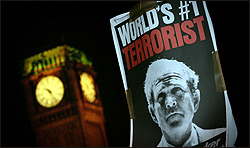I have a three-word response to the media frenzy that followed revelation of the long-secret identity of Deep Throat: Downing Street Memo.
Here’s what John Dean, a key Watergate figure, wrote about Dubya’s case for the Iraq war in a June 2003 column for www.findlaw.com: “To put it bluntly, if Bush has taken Congress and the nation into war based on bogus information, he is cooked. . . . Manipulation or deliberate misuse of national security intelligence data, if proven, could be a ‘high crime’ under the Constitution’s impeachment clause.”
That’s exactly what the Downing Street Memo, first reported a month ago by The Times of London, proves. The memo is an account of the report given to British leadership by Richard Dearlove, head of Britain’s MI-6 (the equivalent of the CIA), after a meeting with top White House officials. Dearlove described, fully eight months before the invasion of Iraq, an American determination to go to war and to manipulate public and congressional opinion with what Dearlove characterized as a “thin” case for the presence of weapons of mass destruction and links between Saddam Hussein and Al Qaeda.
It’s hard not to contrast the frenzy that greeted the revelation of a 30-year-old secret with the thudding indifference U.S. media have given the Downing Street Memo. The memo has scarcely been mentioned in the country’s leading newspapers and has been completely ignored by evening network news.
The reasons are numerous, but it adds up to a depressing reminder that Watergate, as reported in 1972–74, would never be reported today. The same secrecy, paranoia, and demands for absolute loyalty that were the undoing of the Nixon administration have been used, in our modern media climate, with resounding success by the Bush administration. Media outlets today are far less willing to invest the time and money in investigative journalism, far less willing to rock the boat or risk being tagged with the dreaded “liberal media” tag. The right-wing firestorm that followed the miscues of Dan Rather and Newsweek has further cowed big media outlets from taking risks, but the barriers were already there, as Gary Webb could testify if he hadn’t killed himself last December. The career costs can be enormous for enterprising journalists who want to take on power, and the likelihood that your publisher will back you up these days, as Bob Woodward and Carl Bernstein were backed up by The Washington Post, is unpredictable. Webb reported and wrote a series of stories about the CIA and crack cocaine for the San Jose Mercury News in 1996. Under a flurry of criticism, including from other mainstream newspapers, his editors backed away from the series’ findings. Two years later, the CIA confirmed some of Webb’s major findings.
The information needed to impeach George Bush for lying to Congress, the United Nations, and the American public about the most serious imaginable matter—the misuse of military force—is all out there. It’s been reported, in foreign media, in the alternative press, in the margins. But it has not been championed by major media, and so it has not been taken to heart by either the American public or Congress. Bush and his aides intentionally lied about the case for mounting an unprovoked invasion of a sovereign country. The outcome has been a conflict that has so far left more than 1,600 American soldiers dead, many thousands more maimed, and has led to the deaths of an estimated 100,000 Iraqi civilians. The Downing Street Memo erases any doubt about the intentional nature of the disinformation campaign waged upon us to justify this war.
Obviously, a Republican-controlled Congress is not about to impeach its own president. Enormous public pressure would have to be brought to bear. But that public pressure has also been missing, starting with the media coverage. It’s difficult to imagine, at this point, any sort of “smoking gun” sufficient to generate momentum against the Bush administration. Vietnam era dissident Daniel Ellsberg has been touring the country for the past year, urging federal officials within earshot to do as he did with the Pentagon Papers about the Vietnam War, which he leaked to The New York Times—to do as Deep Throat did with the Watergate cover-up, to leak to the press what they know of the Bush administration’s misdeeds. But even that might not be enough, because there is no guarantee that the press would even carry, let alone highlight in proper context, such allegations.
We now know the identity of Deep Throat. Fine. But take a moment to mourn the fact that the courage and integrity displayed by Deep Throat would not be effective today, because there seems to be nobody in our country’s major media willing to hear such secrets. We’ve lost an essential tool for accountability of our country’s highest powers. They still lie and cheat—only, today, we no longer seem to care.







